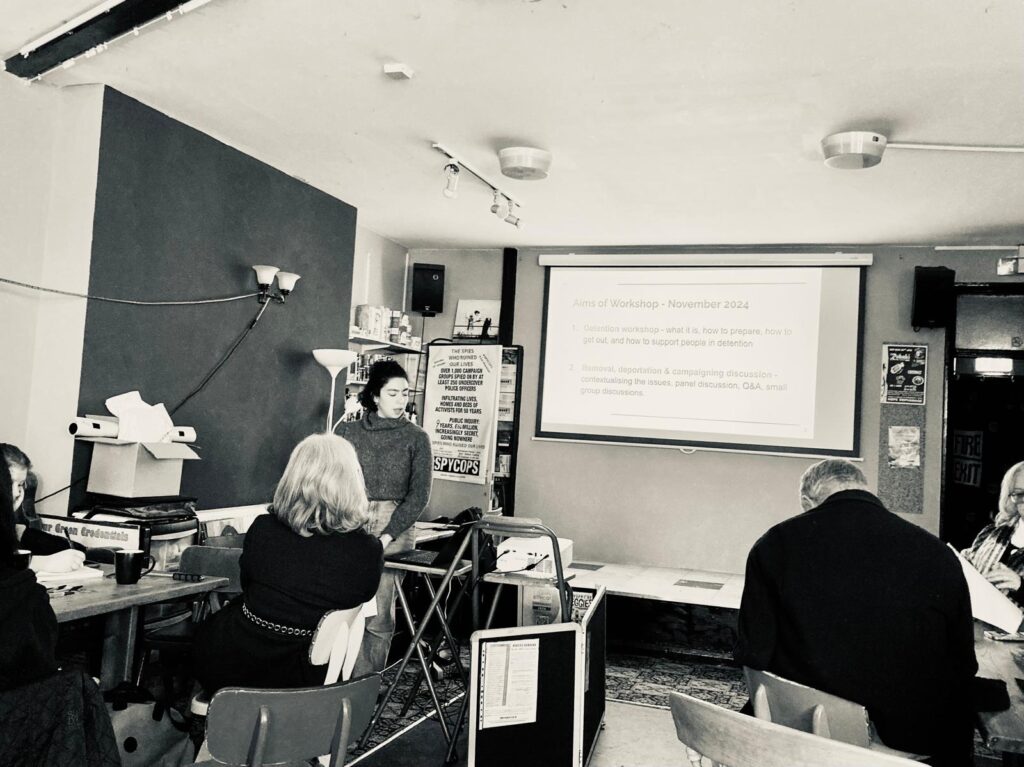
Back in November last year, we took our ‘Thinking with our communities: detention and beyond detention’ event to Nottingham. This was the first time Right to Remain’s current team visited Nottingham. Unlike our previous workshop in Birmingham where we were able to fortify direct working relationships with many local groups, both the registration and attendance at the Nottingham workshop was small. This was expected, of course: a reminder that you need more than a group clicking on our online Toolkit to nurture a relationship that can form a basis for action.
The small size of the group actually afforded us more time, energy and intimacy for impromptu one-to-ones, giving us valuable insights into the local situations. In fact, people came from a number of different locations: Nottingham, Mansfield, Loughborough and across Derbyshire, mirroring the effect of the full-dispersal asylum policy. Surprisingly, many of them had not met before, as if to mirror the atomised existence of individual migrants and those seeking asylum.
What happened at the event?
After Yumna, our Senior Legal Education Officer’s 1-hour workshop that introduced the participants to detention and enforcement, we opened up the space for a community discussion on campaigning. Derbyshire Refugee Solidarity, who previously spoke at our reporting solidarity convening in June did a gripping presentation again sharing their experience of reporting solidarity work outside Loughborough reporting centre which they spearheaded at the time of the Rwanda detention crisis in the spring of 2024.
Just as Steph from BIRCH Network said at our earlier Birmingham event, Coral from Derbyshire Refugee Solidarity stressed how the Rwanda plan suddenly made reporting and detention visible. As a palpable sense of fear entered their safe community space, a sense of outrage also sprang up. Coral explained how they simply did not know that these enforcement activities were happening all along – because, whether out of fear or stigma, no one openly talked about these enforcement measures. Seeing and feeling the Hostile Environment in action was clearly a shock. And just as it happened in the West Midlands with Steph and hundreds of others who got involved, this sudden unveiling of state violence triggered a groundswell of solidarity and care for refugee and migrant communities from many people who joined the support group for people who were reporting at the Loughborough reporting centre.
By happy coincidence, Coral’s presentation was enriched by two other speakers who happened to be there on the day and who generously agreed to speak. One of the participants had lived experience of detention and shared their sobering story of survival. Another participant, Mima, who works at Midlands Migrant Support explained how they support people held at the Swinderby short-term holding facility (STHF) and HMP Morton Hall, a prison exclusively for ‘foreign nationals’.
From a rickety stage next to the projector in a slightly anarchic room of the Sumac Community Centre, I watched everyone intently listening to people’s contributions, thinking about our communities. The impact of this gathering was affirmed in the feedback received:
Thank you. That was a real eye-opener
Would like MORE of these type of events. Great for networking – more SOLIDARITY! MORE PLEASE
Great + fantastic tool / resources / educating on the process and the system
Rejoin[ing] [my] campaign group to see how we can mobilise ourselves again
In response to us asking whether the event had contributed to increased confidence in dealing with a situation of detention or other enforcement measures, one participant wrote “YES. Educate, be open and empower!”
Planting hope and power
The day before, an embargoed copy of an excellent briefing by our friends at the GMIAU (which features our solidarity vigil photo!) landed in my email inbox. GMIAU, in a way that no one has done before, and with their trademark care and depth, meticulously unearthed the impact of the catastrophe that was the previous government’s Rwanda plan on the Greater Manchester community that includes many of our These Walls Must Fall campaigners.
Page 3 of the report shows a timeline of the Rwanda plan and the devastation it inflicted upon us. The timeline starts in April 2022 with Boris Johnson’s announcement of the plan and ends with the far-right riots of summer 2024, a culmination of the government-backed anti-migrant rhetoric that gripped our communities with a raw sense of fear. It is hard not to feel hopeless against the tide of this brutal history.
I’d like to think that Right to Remain’s ‘Thinking with our communities’ initiative traces, continues and, in fact, subverts that timeline in the report – to bury the scar of the Rwanda plan into the ground so that hope and power grows from it. This room, in Nottingham, felt like an unlikely place where such a Herculean task was being accomplished, but that’s what we were doing: turning fear into power.
Our next stop is Sheffield, on 8 February, where our story continues. Join us!
Eiri Ohtani, Director
















Discussion: